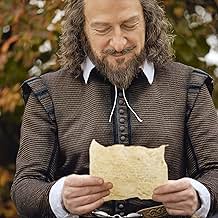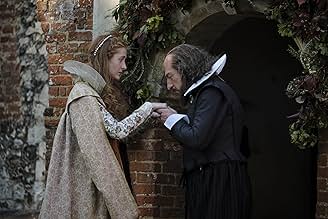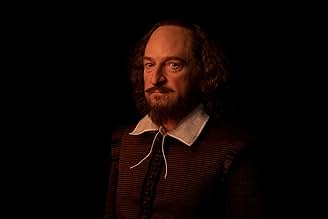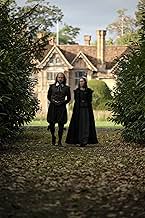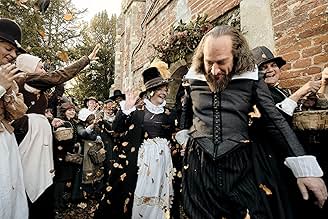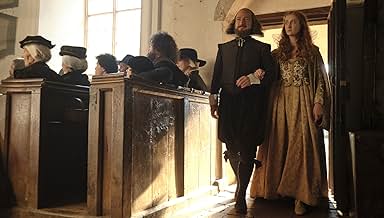IMDb रेटिंग
6.3/10
5.6 हज़ार
आपकी रेटिंग
अपनी भाषा में प्लॉट जोड़ेंA look at the final days in the life of renowned playwright William Shakespeare.A look at the final days in the life of renowned playwright William Shakespeare.A look at the final days in the life of renowned playwright William Shakespeare.
- पुरस्कार
- 1 जीत और कुल 3 नामांकन
Matt Ayleigh
- Frank
- (as Matt Jessup)
कहानी
क्या आपको पता है
- ट्रिवियाIn one of his scenes with Judi Dench, Kenneth Branagh was supposed to directly cite lines from William Shakespeare's work, but he got it slightly wrong, so Dench started to laugh at the mistake. In retort, Branagh quipped "You can probably finish it!", which she promptly did. All of this was obviously not scripted, but nonetheless kept for the finished film.
- गूफ़When talking to the Earl of Southampton, Shakespeare repeatedly addresses him as "Your Grace". When addressing an Earl, the correct form is "My Lord" (only a duke, archbishop or monarch would be addressed as Your Grace). The real William Shakespeare spent enough time around nobility to be well aware of the correct title to use.
- भाव
William Shakespeare: If you want to be a writer, and speak to others and for others, speak first for yourself. Search within. Consider the contents of your own soul. Your humanity. And if you're honest with yourself, then whatever you write, all is true.
- कनेक्शनReferenced in OWV Updates: Christmas Eve 2018 Multimedia Update (2018)
- साउंडट्रैकFear No More
Performed by Abigail Doyle
Music written by Patrick Doyle
Words by William Shakespeare
Published by Patrick Doyle Music Administered by Air-Edel Association L T D
फीचर्ड रिव्यू
Directed, produced by, and starring Kenneth Branagh, All Is True is a pleasant enough film obviously born from great reverence, and, unsurprisingly, brilliantly acted, but is also a curiously formless piece of work, clumsily episodic in structure, and relatively free of conflict, focusing instead on non-incident and trees silhouetted against picturesque sunsets. By the very nature of the years during which it takes place (1613-1616), Ben Elton's screenplay is full of interpolations and suppositions, some of which are interesting, but many of which don't work. There's a much better film hidden in the contours of All Is True, a darker story examining Shakespeare's psychology; his inability to process the death of his son Hamnet, his guilt over the fact that he put his career ahead of his family, his possible misogyny, his obsession with his legacy. These issues are in the background, but they are not the focus, and whilst All Is True is perfectly fine, it's also perfectly forgettable.
Possibly a palette-cleanser for Branagh, allowing him to return to the familiarity of Shakespeare, after several years working on relatively impersonal projects, and with two blockbusters on the way, All Is True begins on June 29, 1613, as Shakespeare (Branagh) watches the Globe Theatre burn to the ground, after a canon misfired during a performance of All Is True. Devastated, Shakespeare retires and returns home to Stratford. Coldly received by his wife Anne (Judi Dench) and youngest daughter, Judith (a superb Kathryn Wilder), he gets a slightly better welcome from his eldest, Susanna (Lydia Wilson). Still mourning the death of Judith's twin, Hamnet (Sam Ellis), his only son, who died from plague aged 11 in 1596, Shakespeare decides to grow a garden to honour his memory. However, he must also try to deal with Judith's hatred for him, stemming from her conviction that he believes the wrong twin died.
The first thing to note about All Is True is how full of references it is to both Shakespeare's plays and incidents (or rumoured incidents) from his life. The idea that Shakespeare retired after the Globe fire is not original to the film, but was first hypothesised by Nicholas Rowe in 1709. Also, as the film shows, when a local man named John Lane (Sean Foley) accused Susanna of adultery, she and her puritan husband John Hall (Hadley Fraser) sued for slander. Also true is that in 1616, shortly after he married Judith, Thomas Quiney (Jack Colgrave Hirst) was charged with "carnal copulation". Admitting to the charge, he was fined five shillings, and Shakespeare altered his will so as to safeguard Judith's entitlements. A third example is a running joke concerning the matrimonial bed. When Shakespeare returns to Stratford, Anne sees him more as a guest, and so assigns him the best bed, as was customary for visitors, whilst she takes the second-best bed. Over the course of the film, he continually tries to work his way back into her good graces (i.e. back into her bed). Famously, Shakespeare left Anne "my second best bed" in his will, something which has caused debate amongst scholars.
Elsewhere, there are references to Titus Andronicus (Shakespeare scares Lane from testifying against Susanna by threatening to tell the Moorish actor who played Aaron, and who is in love with Susanna, about Lane's accusations); The Merry Wives of Windsor (the composition of which Anne points out was what Shakespeare did to avoid dealing with the death of Hamnet); Macbeth ("I once uprooted an entire wood and moved it across a stage to Dunsinane"); The Winter's Tale (Shakespeare mentions that Ben Jonson "laughs at me because I speak no Greek and don't care whether Bohemia has a coast"); the legend that Shakespeare was caught poaching deer from Thomas Lucy's land (during an argument, Shakespeare tells Lucy, "I wish I had poached your bloody deer" - although, in reality, Lucy died in 1600); Robert Greene's contemptuous reference to Shakespeare as, amongst other things, an "upstart crow"; and Richard Burbage ("a brilliant lunatic actor"). I'm also fairly sure Branagh quotes himself at one point; arriving back at Stratford, a shot from inside the Shakespeare house shows the door opening and Shakespeare standing in the doorway, heavily silhouetted against the light, which is exactly how we first see Henry in Branagh's Henry V (1989).
A critical scene, and easily the best in the film, involves Henry Wriothesley, 3rd Earl of Southampton (Ian McKellen) visiting Stratford. Discussing his identity as the "fair youth" to whom Shakespeare addresses the first 126 sonnets, Southampton points out, "it was only flattery of course". When Shakespeare responds, "except, I spoke from deep within my heart", Southampton dismisses him, "well, I was younger then. Younger and prettier". Shakespeare then quotes in its entirety Sonnet 29, with Branagh reading it as an agonised ode to an impossible love. He then alludes to the fact he'd always hoped Southampton may have one day reciprocated his love, to which Southampton reacts sternly, telling him, "you forget yourself, Will, it is not your place to love me". Getting up to leave, Southampton then also recites Sonnet 29, with McKellen's intonation changing it into a celebration of the power of art to transcend such foolish distractions as love. It's a beautifully shot, incredibly well acted, and nuanced scene that, if it accomplishes nothing, serves to remind us just what talented actors can do when reciting the exact same text.
One of the film's main themes is, of course, family, with Elton's script focusing on how resentful Anne and especially Judith have become of Shakespeare. We don't know a great deal about the real Judith, so much of Elton's characterisation is speculative. The film's Judith is essentially a protofeminist, a brilliant, complex, and acerbic woman railing against the narrow-minded patriarchy her father endorses. The likelihood of this being the case is slim at best, but Wilder is excellent in the part and makes Judith much more believable than the character has any right to be. Where Elton is more successful, and on firmer factual ground, is that Shakespeare's interest in his daughters' marriages revolves primarily (if not exclusively) around whether they can give him male grandchildren, now that Hamnet can't carry on the family name. The film acknowledges that Shakespeare was a neglectful father and husband, and never fully gets behind him as he defends himself by citing the cultivation of his genius, pointing out that his talents made the family very wealthy, and thus he should be excused. However, by the end, even he doesn't believe this himself, coming to understand the price his family paid for his greatness.
However, there are some considerable problems. First and foremost is the script, which has a strangely formless structure, derived from an extremely episodic organisational principal, with scene after scene addressing one and only one issue at a time, ensuring each issue is cleared before moving onto the next. Scenes often involve the characters saying only what is necessary to get to the next scene, with little room to breathe, almost as if we're watching a "previously on" montage of a TV show. Because of this, when we do get scenes that are given a bit of time, such as the Southampton scene, they stick out, stylistically detached from the surrounding material.
Another issue with the script is its use of 21st-century gender politics. The question the film raises is an interesting one - was Shakespeare so ensconced in patriarchal thinking that the lack of a male heir blinded him to the fact that one of his daughters may have had the ability to carry on his poetic legacy, if not his name. With every woman around Shakespeare a protofeminist, each of them more progressive (in the modern sense of the term) than him, the film builds to the moment when he comes to see they were right all along, scolding himself for his short-sightedness and boldly embracing the idea of gender equality. It's a poor attempt to graft contemporary ideology onto an epoch that simply had different beliefs. It's one thing to say Shakespeare may have been in been in favour of the female parts being played by women. It's one thing to say that The Taming of the Shrew may have been written to satirise and mock misogynistic attitudes rather than endorse them. It's something else entirely to say that Shakespeare, by the end of his life, was a feminist, and would eagerly have burnt his bra.
The casting is also problematic. Now, don't get me wrong, I love Dench and McKellen as much as the next man, but that doesn't change the fact that they are both badly miscast. Both play their characters as elderly, but in 1613-1616, Anne (played by the 84-year-old Dench) was 57-60, and Southampton (played by the 79-year-old McKellen) was only 40-43. Additionally, Anne was six years older than Shakespeare, but Dench is 26 years older than Branagh, and it shows, serving only to distract from the content.
As a Kenneth Branagh fan (and a fan of Ben Elton's wonderfully irreverent comedy Upstart Crow (2016)), I was disappointed with All Is True. Equal parts sullen and playful, Branagh's Shakespeare is both an extraordinary genius, not of the ilk of everyday mundanity, and a man who lives in the world and must deal with its absurdities. The film tries to strike a balance between a laid-back and wistful story about a retired writer, and a study of filial grief, with the dawning realisation that much of that grief could have been avoided. Some elements unquestionably work; the Southampton scene, Shakespeare's struggle to reconcile his genius with the personal cost of that genius for both himself and others, Judith's resentment of Hamnet. But a lot doesn't work. It's an inoffensive and perfectly fine film, but given the director and the subject, it could, and should, have been so much better.
Possibly a palette-cleanser for Branagh, allowing him to return to the familiarity of Shakespeare, after several years working on relatively impersonal projects, and with two blockbusters on the way, All Is True begins on June 29, 1613, as Shakespeare (Branagh) watches the Globe Theatre burn to the ground, after a canon misfired during a performance of All Is True. Devastated, Shakespeare retires and returns home to Stratford. Coldly received by his wife Anne (Judi Dench) and youngest daughter, Judith (a superb Kathryn Wilder), he gets a slightly better welcome from his eldest, Susanna (Lydia Wilson). Still mourning the death of Judith's twin, Hamnet (Sam Ellis), his only son, who died from plague aged 11 in 1596, Shakespeare decides to grow a garden to honour his memory. However, he must also try to deal with Judith's hatred for him, stemming from her conviction that he believes the wrong twin died.
The first thing to note about All Is True is how full of references it is to both Shakespeare's plays and incidents (or rumoured incidents) from his life. The idea that Shakespeare retired after the Globe fire is not original to the film, but was first hypothesised by Nicholas Rowe in 1709. Also, as the film shows, when a local man named John Lane (Sean Foley) accused Susanna of adultery, she and her puritan husband John Hall (Hadley Fraser) sued for slander. Also true is that in 1616, shortly after he married Judith, Thomas Quiney (Jack Colgrave Hirst) was charged with "carnal copulation". Admitting to the charge, he was fined five shillings, and Shakespeare altered his will so as to safeguard Judith's entitlements. A third example is a running joke concerning the matrimonial bed. When Shakespeare returns to Stratford, Anne sees him more as a guest, and so assigns him the best bed, as was customary for visitors, whilst she takes the second-best bed. Over the course of the film, he continually tries to work his way back into her good graces (i.e. back into her bed). Famously, Shakespeare left Anne "my second best bed" in his will, something which has caused debate amongst scholars.
Elsewhere, there are references to Titus Andronicus (Shakespeare scares Lane from testifying against Susanna by threatening to tell the Moorish actor who played Aaron, and who is in love with Susanna, about Lane's accusations); The Merry Wives of Windsor (the composition of which Anne points out was what Shakespeare did to avoid dealing with the death of Hamnet); Macbeth ("I once uprooted an entire wood and moved it across a stage to Dunsinane"); The Winter's Tale (Shakespeare mentions that Ben Jonson "laughs at me because I speak no Greek and don't care whether Bohemia has a coast"); the legend that Shakespeare was caught poaching deer from Thomas Lucy's land (during an argument, Shakespeare tells Lucy, "I wish I had poached your bloody deer" - although, in reality, Lucy died in 1600); Robert Greene's contemptuous reference to Shakespeare as, amongst other things, an "upstart crow"; and Richard Burbage ("a brilliant lunatic actor"). I'm also fairly sure Branagh quotes himself at one point; arriving back at Stratford, a shot from inside the Shakespeare house shows the door opening and Shakespeare standing in the doorway, heavily silhouetted against the light, which is exactly how we first see Henry in Branagh's Henry V (1989).
A critical scene, and easily the best in the film, involves Henry Wriothesley, 3rd Earl of Southampton (Ian McKellen) visiting Stratford. Discussing his identity as the "fair youth" to whom Shakespeare addresses the first 126 sonnets, Southampton points out, "it was only flattery of course". When Shakespeare responds, "except, I spoke from deep within my heart", Southampton dismisses him, "well, I was younger then. Younger and prettier". Shakespeare then quotes in its entirety Sonnet 29, with Branagh reading it as an agonised ode to an impossible love. He then alludes to the fact he'd always hoped Southampton may have one day reciprocated his love, to which Southampton reacts sternly, telling him, "you forget yourself, Will, it is not your place to love me". Getting up to leave, Southampton then also recites Sonnet 29, with McKellen's intonation changing it into a celebration of the power of art to transcend such foolish distractions as love. It's a beautifully shot, incredibly well acted, and nuanced scene that, if it accomplishes nothing, serves to remind us just what talented actors can do when reciting the exact same text.
One of the film's main themes is, of course, family, with Elton's script focusing on how resentful Anne and especially Judith have become of Shakespeare. We don't know a great deal about the real Judith, so much of Elton's characterisation is speculative. The film's Judith is essentially a protofeminist, a brilliant, complex, and acerbic woman railing against the narrow-minded patriarchy her father endorses. The likelihood of this being the case is slim at best, but Wilder is excellent in the part and makes Judith much more believable than the character has any right to be. Where Elton is more successful, and on firmer factual ground, is that Shakespeare's interest in his daughters' marriages revolves primarily (if not exclusively) around whether they can give him male grandchildren, now that Hamnet can't carry on the family name. The film acknowledges that Shakespeare was a neglectful father and husband, and never fully gets behind him as he defends himself by citing the cultivation of his genius, pointing out that his talents made the family very wealthy, and thus he should be excused. However, by the end, even he doesn't believe this himself, coming to understand the price his family paid for his greatness.
However, there are some considerable problems. First and foremost is the script, which has a strangely formless structure, derived from an extremely episodic organisational principal, with scene after scene addressing one and only one issue at a time, ensuring each issue is cleared before moving onto the next. Scenes often involve the characters saying only what is necessary to get to the next scene, with little room to breathe, almost as if we're watching a "previously on" montage of a TV show. Because of this, when we do get scenes that are given a bit of time, such as the Southampton scene, they stick out, stylistically detached from the surrounding material.
Another issue with the script is its use of 21st-century gender politics. The question the film raises is an interesting one - was Shakespeare so ensconced in patriarchal thinking that the lack of a male heir blinded him to the fact that one of his daughters may have had the ability to carry on his poetic legacy, if not his name. With every woman around Shakespeare a protofeminist, each of them more progressive (in the modern sense of the term) than him, the film builds to the moment when he comes to see they were right all along, scolding himself for his short-sightedness and boldly embracing the idea of gender equality. It's a poor attempt to graft contemporary ideology onto an epoch that simply had different beliefs. It's one thing to say Shakespeare may have been in been in favour of the female parts being played by women. It's one thing to say that The Taming of the Shrew may have been written to satirise and mock misogynistic attitudes rather than endorse them. It's something else entirely to say that Shakespeare, by the end of his life, was a feminist, and would eagerly have burnt his bra.
The casting is also problematic. Now, don't get me wrong, I love Dench and McKellen as much as the next man, but that doesn't change the fact that they are both badly miscast. Both play their characters as elderly, but in 1613-1616, Anne (played by the 84-year-old Dench) was 57-60, and Southampton (played by the 79-year-old McKellen) was only 40-43. Additionally, Anne was six years older than Shakespeare, but Dench is 26 years older than Branagh, and it shows, serving only to distract from the content.
As a Kenneth Branagh fan (and a fan of Ben Elton's wonderfully irreverent comedy Upstart Crow (2016)), I was disappointed with All Is True. Equal parts sullen and playful, Branagh's Shakespeare is both an extraordinary genius, not of the ilk of everyday mundanity, and a man who lives in the world and must deal with its absurdities. The film tries to strike a balance between a laid-back and wistful story about a retired writer, and a study of filial grief, with the dawning realisation that much of that grief could have been avoided. Some elements unquestionably work; the Southampton scene, Shakespeare's struggle to reconcile his genius with the personal cost of that genius for both himself and others, Judith's resentment of Hamnet. But a lot doesn't work. It's an inoffensive and perfectly fine film, but given the director and the subject, it could, and should, have been so much better.
टॉप पसंद
रेटिंग देने के लिए साइन-इन करें और वैयक्तिकृत सुझावों के लिए वॉचलिस्ट करें
- How long is All Is True?Alexa द्वारा संचालित
विवरण
- रिलीज़ की तारीख़
- कंट्री ऑफ़ ओरिजिन
- आधिकारिक साइटें
- भाषा
- इस रूप में भी जाना जाता है
- الكل حقيقي
- फ़िल्माने की जगहें
- Dorney Court, Dorney, Buckinghamshire, इंग्लैंड, यूनाइटेड किंगडम(New Place, Stratford-upon-Avon, Shakespeare's home)
- उत्पादन कंपनी
- IMDbPro पर और कंपनी क्रेडिट देखें
बॉक्स ऑफ़िस
- US और कनाडा में सकल
- $12,00,481
- US और कनाडा में पहले सप्ताह में कुल कमाई
- $44,211
- 12 मई 2019
- दुनिया भर में सकल
- $30,19,143
- चलने की अवधि1 घंटा 41 मिनट
- रंग
- पक्ष अनुपात
- 2.39 : 1
इस पेज में योगदान दें
किसी बदलाव का सुझाव दें या अनुपलब्ध कॉन्टेंट जोड़ें








